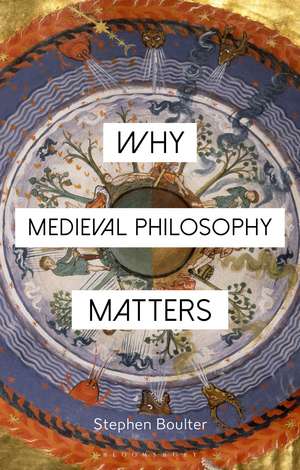Why Medieval Philosophy Matters: Why Philosophy Matters
Autor Stephen Boulteren Limba Engleză Paperback – 23 ian 2019
| Toate formatele și edițiile | Preț | Express |
|---|---|---|
| Paperback (1) | 171.85 lei 6-8 săpt. | |
| Bloomsbury Publishing – 23 ian 2019 | 171.85 lei 6-8 săpt. | |
| Hardback (1) | 496.04 lei 6-8 săpt. | |
| Bloomsbury Publishing – 23 ian 2019 | 496.04 lei 6-8 săpt. |
Preț: 171.85 lei
Preț vechi: 223.71 lei
-23% Nou
Puncte Express: 258
Preț estimativ în valută:
32.88€ • 34.49$ • 27.37£
32.88€ • 34.49$ • 27.37£
Carte tipărită la comandă
Livrare economică 01-15 aprilie
Preluare comenzi: 021 569.72.76
Specificații
ISBN-13: 9781350094161
ISBN-10: 1350094161
Pagini: 216
Dimensiuni: 138 x 216 x 15 mm
Greutate: 0.32 kg
Editura: Bloomsbury Publishing
Colecția Bloomsbury Academic
Seria Why Philosophy Matters
Locul publicării:London, United Kingdom
ISBN-10: 1350094161
Pagini: 216
Dimensiuni: 138 x 216 x 15 mm
Greutate: 0.32 kg
Editura: Bloomsbury Publishing
Colecția Bloomsbury Academic
Seria Why Philosophy Matters
Locul publicării:London, United Kingdom
Caracteristici
Includes a glossary of key terms and recommendations for further reading (especially for engaging with medieval philosophy outside of the Western tradition)
Notă biografică
Stephen Boulter is Senior Lecturer in Philosophy and Ethics, Oxford Brookes University, UK. He is author of The Rediscovery of Common Sense Philosophy (2007) and Metaphysics from a Biological Point of View (2013).
Cuprins
prefaceIntroductionChapter 1. Medieval Philosophy and Common SenseChapter 2. Medieval Philosophy and the SciencesChapter 3. Medieval Philosophy and MethodologyChapter 4. What Philosophers Used to Know (The art of distinctions)Chapter 5. The Best Argument for the Existence of God (Scotus' De Primo Principio)Chapter 6. Medieval Philosophy and the Problem of Western DisenchantmentBibliographyIndex
Recenzii
This volume is important for recognizing the value of medieval philosophy and its place in Western intellectual history. Scholarly yet accessible, the book will be embraced by both specialists and generalists, including those who wish to expand their interests beyond texts assigned in most introductory philosophy courses. Summing Up: Recommended. Upper-division undergraduates through faculty.
Stephen Boulter's book provides a cogent answer to the question of why medieval philosophy matters, by making the case that the scholastics had a distinctive and strong sense of their identity and utility within society as philosophers - a sense that has to some degree been forgotten in the modern era. The medievals saw themselves as usefully engaged in addressing important questions arising within the sciences and explored within society at large; their texts paradigmatically convey to the reader a sense of the value of philosophy and of the philosopher's intellectual responsibilities and goals within society at large. The book will be a useful read for anyone, including those who might want to critically engage with its overall argument.
This stimulating and highly original book makes a powerful case for the relevance of medieval philosophy to the methodology and content of contemporary natural sciences. It will be read with profit and great interest by all interested in medieval philosophy and its significance for the modern world.
Stephen Boulter's book provides a cogent answer to the question of why medieval philosophy matters, by making the case that the scholastics had a distinctive and strong sense of their identity and utility within society as philosophers - a sense that has to some degree been forgotten in the modern era. The medievals saw themselves as usefully engaged in addressing important questions arising within the sciences and explored within society at large; their texts paradigmatically convey to the reader a sense of the value of philosophy and of the philosopher's intellectual responsibilities and goals within society at large. The book will be a useful read for anyone, including those who might want to critically engage with its overall argument.
This stimulating and highly original book makes a powerful case for the relevance of medieval philosophy to the methodology and content of contemporary natural sciences. It will be read with profit and great interest by all interested in medieval philosophy and its significance for the modern world.








